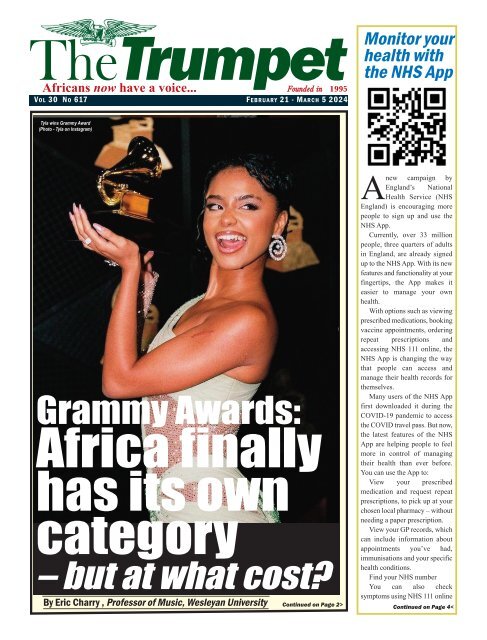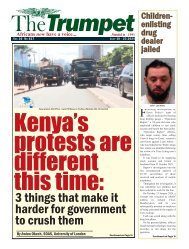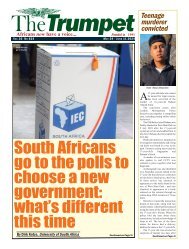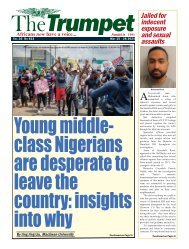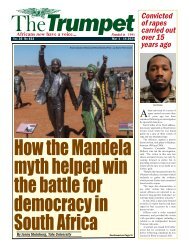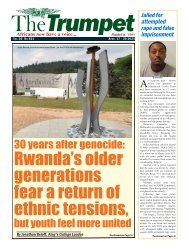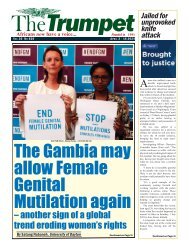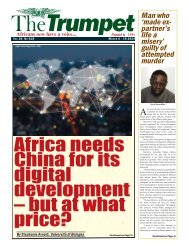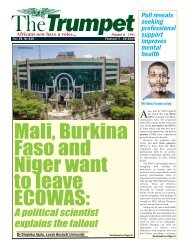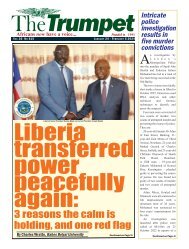The Trumpet Newspaper Issue 617 (February 21 - March 5 2024)
Africa finally has its own category at the Grammy Awards
Africa finally has its own category at the Grammy Awards
You also want an ePaper? Increase the reach of your titles
YUMPU automatically turns print PDFs into web optimized ePapers that Google loves.
<strong>The</strong><strong>Trumpet</strong><br />
Africans now have a voice... Founded in 1995<br />
V O L 30 N O <strong>617</strong> F E B R U A R Y <strong>21</strong> - MARCH 5 <strong>2024</strong><br />
Monitor your<br />
health with<br />
the NHS App<br />
Tyla wins Grammy Award<br />
(Photo - Tyla on Instagram)<br />
Grammy Awards:<br />
Africa finally<br />
has its own<br />
category<br />
– but at what cost?<br />
By Eric Charry , Professor of Music, Wesleyan University<br />
Continued on Page 2><br />
Anew campaign by<br />
England’s National<br />
Health Service (NHS<br />
England) is encouraging more<br />
people to sign up and use the<br />
NHS App.<br />
Currently, over 33 million<br />
people, three quarters of adults<br />
in England, are already signed<br />
up to the NHS App. With its new<br />
features and functionality at your<br />
fingertips, the App makes it<br />
easier to manage your own<br />
health.<br />
With options such as viewing<br />
prescribed medications, booking<br />
vaccine appointments, ordering<br />
repeat prescriptions and<br />
accessing NHS 111 online, the<br />
NHS App is changing the way<br />
that people can access and<br />
manage their health records for<br />
themselves.<br />
Many users of the NHS App<br />
first downloaded it during the<br />
COVID-19 pandemic to access<br />
the COVID travel pass. But now,<br />
the latest features of the NHS<br />
App are helping people to feel<br />
more in control of managing<br />
their health than ever before.<br />
You can use the App to:<br />
View your prescribed<br />
medication and request repeat<br />
prescriptions, to pick up at your<br />
chosen local pharmacy – without<br />
needing a paper prescription.<br />
View your GP records, which<br />
can include information about<br />
appointments you’ve had,<br />
immunisations and your specific<br />
health conditions.<br />
Find your NHS number<br />
You can also check<br />
symptoms using NHS 111 online<br />
Continued on Page 4
Page2 <strong>The</strong><strong>Trumpet</strong> FEBRUARY <strong>21</strong> - MARCH 5 <strong>2024</strong><br />
News<br />
Grammy Awards:<br />
Africa finally has its own category<br />
– but at what cost?<br />
Continued from Page 1<<br />
For the first time in its 65-year history, the<br />
Grammy Awards in the US has<br />
introduced an African category, Best<br />
African Music Performance, which recognises<br />
the song of the year.<br />
<strong>The</strong> Grammys is the most prestigious<br />
award in the largest music industry in the world.<br />
Its focus has always been US music styles in<br />
categories like pop, R&B, rap, country, jazz and<br />
classical.<br />
As musical styles from abroad (or in<br />
Spanish) have moved into the US commercial<br />
market, the Grammy Foundation has tried to<br />
recognise them – beyond the generic “folk<br />
music” category it first used to put them in. So<br />
categories were established like Latin,<br />
Mexican, reggae, world music and global<br />
music.<br />
Now Africa has its own best song category,<br />
the first continent with this distinction. This is<br />
clearly a nod to the growing popularity of<br />
African music in the US – notably Afrobeats<br />
from Nigeria.<br />
Few African artists received Grammy<br />
nominations until 1992, when the Best World<br />
Music Album category was added. A diverse<br />
range of African music came to dominate this<br />
category. But “world music” was criticised for<br />
being outmoded. <strong>The</strong> award was renamed Best<br />
Global Music Album in 20<strong>21</strong>. <strong>The</strong> reasons<br />
given included:<br />
<strong>The</strong> change symbolises a departure from<br />
the connotations of colonialism, folk and ‘non-<br />
American’.<br />
<strong>The</strong> new name came with a shift in which<br />
music received nominations. “World music”<br />
tended to recognise regional music styles<br />
released on small independent labels. “Global<br />
music” was seemingly more focused on more<br />
commercial music that was also reaching the<br />
US charts. It tended to reward Afrobeats and<br />
other popular electronic dance music that took<br />
creative cues from the US.<br />
Solicitor and Partner<br />
of an award-winning<br />
law firm<br />
S.A.J<br />
LEGAL<br />
based in the heart of<br />
Central London -<br />
Kolade Jegede<br />
specializes in:<br />
Immigration - Preparing of all<br />
Immigration matters, including<br />
Appeal Challenges and Tribunal<br />
Representation.<br />
Employment - Handling all types<br />
of Employment Claims.<br />
Family Law - Dealing with Divorce<br />
Applications, Financial Arrangements,<br />
and Applying for Non-Molestation /<br />
Occupational Orders.<br />
First consultation is FREE.<br />
T: 07818 118656 E: kj@saj.legal<br />
How music represents and expresses<br />
identity and cultural authenticity has been a key<br />
issue in my research as an ethnomusicologist.<br />
Certainly, generational shifts happen and<br />
interests in some deeply rooted traditions may<br />
fade in favour of new global currents. But still,<br />
I have mixed reactions to the new award. <strong>The</strong><br />
economic boon that the Grammys brings to the<br />
African music industry could be significant. But<br />
at what cost to its diversity of offerings?<br />
<strong>The</strong> Grammys claims to recognise<br />
excellence. But it also celebrates US cultural<br />
imperialism and commercial success – a track<br />
record evident in its history.<br />
This first batch of best performance<br />
nominees provides further clues that US record<br />
conglomerates are strongly shaping Grammy<br />
recognition.<br />
Tyla Seethal (Photo - Tyla on Facebook)<br />
Africa at the Grammys<br />
<strong>The</strong> first Grammy Awards ceremony was in<br />
1959, the same year South African star Miriam<br />
Makeba first toured the US.<br />
In 1960 the Best Folk Performance<br />
category was added. This was the key. In 1961,<br />
Makeba received three nominations (new artist,<br />
female vocalist and folk). She was the first<br />
African artist nominated and it happened again<br />
in 1964 and 1965. Folk was the only category<br />
that could accommodate singing like hers – in<br />
South African languages with acoustic string<br />
instruments and hand percussion.<br />
In 1966 Makeba won her only Grammy. It<br />
was in the folk category. She had two albums in<br />
the running: Makeba Sings and the winner, An<br />
Evening with Belafonte/Makeba.<br />
Harry Belafonte was a well-established US<br />
singer and film star. His early sponsorship was<br />
essential. This would be a recurring theme,<br />
from Paul Simon and Ladysmith Black<br />
Mambazo to Peter Gabriel and Youssou<br />
N’Dour to Drake and Wizkid to Beyoncé and<br />
the predominantly Nigerian artists on her 2019<br />
Lion King album. Burna Boy, who appeared on<br />
it, received his first Grammy nomination the<br />
following year.<br />
On the charts<br />
Makeba was also the first African artist to<br />
break into the upper reaches of the US<br />
Billboard charts (Pata Pata reached number 12<br />
in 1967). She was followed by South African<br />
Hugh Masekela’s Grazing in the Grass (first<br />
spot in 1968) and Cameroonian Manu<br />
Dibango’s Soul Makossa (35th in 1973). <strong>The</strong>n<br />
a long drought.<br />
Masekela’s feat has yet to be duplicated by<br />
an African born-and-raised solo artist. Sade,<br />
Seal, Akon and Chamillionaire, children of<br />
immigrants from Nigeria or Senegal in the US<br />
and the UK, all hit number one. Sade and Seal<br />
won Grammys.<br />
Nigeria’s Wizkid hit top spot as a guest of<br />
Drake (2016) and Tems when sampled by<br />
Future (2022).<br />
From folk music to world music<br />
<strong>The</strong> term “world music” was used by<br />
global heritage body UNESCO as early as<br />
1948 to create a music catalogue and later<br />
sponsor a library of albums from over 70<br />
countries. Ethnomusicologists expanded the<br />
term to “incorporate the total range of music”,<br />
an early attempt to decolonise musical<br />
institutions.<br />
In 1987 some British independent record<br />
label execs adopted “world music” as a<br />
marketing category for retailers to give<br />
visibility to albums that didn’t have a place<br />
on the shelf. <strong>The</strong> Grammys first awarded the<br />
Best World Music Album in 1992. It split into<br />
“traditional” and “contemporary” in 2004 but<br />
merged again in 2012.<br />
<strong>The</strong> new category provided a huge boost<br />
for African artists. In seven of the eight years<br />
of the traditional award the winners were<br />
South African choral groups and Malian kora<br />
players. Angelique Kidjo from Benin alone<br />
won four times before the name change.<br />
Cameroon, Cape Verde, Democratic Republic<br />
of Congo, Ghana, Madagascar, Malawi,<br />
Morocco, Nigeria, Senegal and Uganda also<br />
received nominations.<br />
But objections to “world music” persisted<br />
for being a catch-all category that<br />
marginalised artists and their cultures.<br />
From world music to global music<br />
So the Grammys announced in 2020 that<br />
“world music” was being replaced by “global<br />
music”, offering “a fresh perspective fuelled<br />
by authenticity, diversity and direct<br />
inclusion”.<br />
An article at entertainment website<br />
UPROXX earlier in 2020 argued that Burna<br />
Boy’s loss at his first Grammys highlighted<br />
the problems with the world music category.<br />
UPROXX is a Warner Music Group<br />
independent subsidiary; Burna Boy is signed<br />
to Warner. Perhaps they caught the ear of the<br />
Grammy Foundation. He won the debut Best<br />
Global Music Album award in 20<strong>21</strong>. A new<br />
category for songs – Best Global Music<br />
Performance – was added the following year.<br />
Nigeria has been the only country with<br />
nominees each year of the global album<br />
category. <strong>The</strong> two new global music<br />
categories have particularly benefited<br />
Afrobeats artists with major label support,<br />
like Wizkid (RCA), Burna Boy (Warner) and<br />
Davido (Columbia/Sony). Authenticity for the<br />
Grammys, it appears, is shaped by what the<br />
largest numbers of people are listening to.<br />
<strong>The</strong> role of Afrobeats<br />
Afrobeats, a hybrid genre with roots in<br />
Continued on Page 3
News<br />
FEBRUARY <strong>21</strong> - MARCH 5 <strong>2024</strong><br />
<strong>The</strong><strong>Trumpet</strong><br />
Grammy Awards:<br />
Africa finally has its own category<br />
– but at what cost?<br />
Page3<br />
Continued from Page 2<<br />
Nigeria and Ghana and named in the UK in the<br />
early 2010s, is so big in the US it even has its<br />
own Billboard chart.<br />
Currently driving the scene is Burna Boy.<br />
In <strong>2024</strong> he has four Grammy nominations<br />
(African performance, global album, global<br />
performance and melodic rap).<br />
Burna Boy himself offers a critique of<br />
Afrobeats, a label he shuns:<br />
<strong>The</strong>re’s no substance, like nobody is talking<br />
about anything. It’s just a great time, it’s an<br />
amazing time … But at the end of the day, life<br />
is not an amazing time.<br />
Five of the seven nominees in the new African<br />
category are Nigerian. (Asake, Burna Boy,<br />
Davido, Olamide and Ayra Starr; Musa Keys and<br />
Tyla are South African.) Afrobeats is big business.<br />
Indeed, the new African category was created after<br />
the head of the Grammys travelled to Africa to<br />
speak with music industry leaders.<br />
African artists have now been offered a seat<br />
at the table. And the stakes for the<br />
representation of African culture have just been<br />
raised.<br />
Samson Uchenna Eze contributed to the<br />
Afrobeats portion of this article. He’s<br />
completing a Master’s thesis on Afrobeats<br />
Feminism at Wesleyan University.<br />
Eric Charry is a Professor of Music at<br />
Wesleyan University.<br />
This article is republished from <strong>The</strong><br />
Conversation under a Creative Commons<br />
license. Read the original article.
Page4<br />
<strong>The</strong><strong>Trumpet</strong><br />
<strong>The</strong><strong>Trumpet</strong> Group<br />
Field: 07956 385 604<br />
E-mail:<br />
info@the-trumpet.com<br />
<strong>The</strong><strong>Trumpet</strong>Team<br />
PUBLISHER / EDITOR-IN-CHIEF:<br />
’Femi Okutubo<br />
FEBRUARY <strong>21</strong> - MARCH 5 <strong>2024</strong><br />
News<br />
Monitor your health with<br />
the NHS App<br />
Continued from Page 1<<br />
CONTRIBUTORS:<br />
Moji Idowu, Ayo Odumade,<br />
Steve Mulindwa<br />
SPECIAL PROJECTS:<br />
Odafe Atogun<br />
John-Brown Adegunsoye (Abuja)<br />
DESIGN:<br />
Xandydesigns@gmail.com<br />
ATLANTA BUREAU CHIEF:<br />
Uko-Bendi Udo<br />
3695 F Cascade Road #<strong>21</strong>40 Atlanta,<br />
GA 30331 USA<br />
Tel: +1 404 889 3613<br />
E-mail: uudo1@hotmail.com<br />
BOARD OF CONSULTANTS<br />
CHAIRMAN:<br />
Pastor Kolade Adebayo-Oke<br />
MEMBERS:<br />
Tunde Ajasa-Alashe<br />
Allison Shoyombo, Peter Osuhon<br />
<strong>The</strong><strong>Trumpet</strong> (ISSN: 1477-3392)<br />
is published in London fortnightly<br />
THINKING<br />
OF<br />
WRITING<br />
A BUSINESS<br />
PLAN?<br />
We can help you develop a<br />
professional business plan<br />
from only £250.<br />
For more information, contact us<br />
at 0740279<strong>21</strong>46 or email us at:<br />
tolu.oyewole@consultant.com<br />
via the App, find local NHS services<br />
– such as urgent care, pharmacies<br />
and urgent treatment centres – and<br />
even browse through more general<br />
information about medication or<br />
medical conditions.<br />
Almost half of people signed up<br />
to the NHS App already use it<br />
regularly, with 25.8 million logins in<br />
November 2023 – the equivalent of<br />
10 every second. <strong>The</strong> new NHS<br />
campaign aims to raise awareness of<br />
the many possible uses of the App<br />
and encourage even more users, by<br />
showing how it can save people<br />
time and help them feel in control of<br />
their health.<br />
Healthcare professionals in the<br />
community are increasingly seeing<br />
the benefits of the NHS App for<br />
patients, who are able to manage<br />
different aspects of their health with<br />
greater ease and often with less need<br />
for direct contact with their GP<br />
surgery. Over the last five years, a<br />
total of 66.1 million repeat<br />
prescriptions have been ordered<br />
through the App, saving valuable<br />
time for patients and clinicians.<br />
Dr Julie Hammond, GP said: “I<br />
suggest to all of my patients that<br />
they use the NHS App – it makes<br />
their busy lives that bit simpler and<br />
gives them more control over their<br />
health. Over the winter months<br />
everything can seem more<br />
challenging when it comes to our<br />
health, but something like ordering<br />
a repeat prescription on the App is<br />
so easy to do. You don’t have to go<br />
to your GP and you can do it at<br />
home, on the go, wherever you want<br />
to. You’ve always got your phone<br />
with you, so you always have the<br />
NHS App with you too.”<br />
Start using the App today. For<br />
more information, including how<br />
to download the NHS App, please<br />
visit www.nhs.uk/nhsapp<br />
or scan the QR code
FEBRUARY <strong>21</strong> - MARCH 5 <strong>2024</strong> <strong>The</strong><strong>Trumpet</strong><br />
Page5
Page6 <strong>The</strong><strong>Trumpet</strong> FEBRUARY <strong>21</strong> - MARCH 5 <strong>2024</strong><br />
PRODUCED IN ASSOCIATION WITH UK GOVERNMENT<br />
ADVERTORIAL<br />
SAVE MONEY AND ENERGY<br />
THIS WINTER<br />
Smart tips to help you<br />
reduce your energy<br />
consumption this<br />
winter<br />
Winter is here, and when we<br />
start heating our homes, our<br />
energy bills can go up. If you<br />
want to save money this winter, there<br />
are affordable things you can do at<br />
home to use less energy while<br />
staying warm and safe. Even small<br />
changes can help lower your energy<br />
costs.<br />
It all adds up<br />
Prepare to cut your winter energy bills<br />
and save money. <strong>The</strong>re are simple<br />
steps that we can all take to reduce<br />
our energy usage and the associated<br />
energy costs. We have outlined these<br />
below, anything you can do will have<br />
an impact however implementing<br />
these together can make a great<br />
difference.<br />
Six tips for success!<br />
• Reduce your boiler flow<br />
temperature to 60 degrees to save<br />
up to £70 per year.<br />
• Release air from your radiators by<br />
‘bleeding’ them using a radiator<br />
key.<br />
• Arrange for your boiler to be<br />
serviced by a qualified boiler<br />
technician.<br />
• Keep the rooms you’re using<br />
warm, perhaps by keeping doors<br />
closed and lower radiator settings<br />
Stephen Daley<br />
in unused rooms to potentially save<br />
around £50 annually.<br />
• Add an energy-efficient<br />
showerhead in your shower to save<br />
about £40 each year.<br />
• Lower your washing machine’s<br />
temperature setting from 40<br />
degrees C to 30 degrees C to save<br />
around £20 annually.<br />
<strong>The</strong> <strong>Trumpet</strong> spoke to Stephen<br />
Daley, from London who is aware of<br />
this money-saving advice and uses a<br />
couple of the suggestions on a<br />
regular basis.<br />
Q. What is the process for bleeding<br />
radiators, and do you find that it<br />
helps?<br />
A. <strong>The</strong> process is quite<br />
straightforward, I use a standard<br />
radiator key which is readily available<br />
from most DIY shops, I simply open<br />
the air valve which is normally located<br />
at the top right-hand side of the<br />
radiator. I gently open it until I can<br />
hear the air escaping, at some point,<br />
a trickle of water will appear that is<br />
the time to close the valve. My<br />
radiators are really hot and effective<br />
after this.<br />
Q. Any advice on how you keep<br />
your rooms warm?<br />
A. I simply follow the advice and<br />
make sure that the door to the room I<br />
am in is closed, if it’s in the evening I<br />
also close the curtains as I find that<br />
this also helps to keep the heat in and<br />
the room at a nice steady<br />
temperature.<br />
Q. How often do you get your<br />
boiler serviced?<br />
A. My boiler is serviced annually as<br />
part of a service plan with my energy<br />
provider, this normally happens<br />
during the summertime. This ensures<br />
that my heating system is working<br />
well and is ready to go when the<br />
winter switch-on happens later in the<br />
year.<br />
Enhance your<br />
system’s heating<br />
efficiency for<br />
energy savings<br />
If you use a Combi boiler, you can<br />
improve its efficiency by setting the<br />
‘flow temperature’ to 60 degrees.<br />
Lowering the flow temperature won’t<br />
noticeably decrease your home’s<br />
temperature, although it might take a<br />
bit longer to warm up. If you’re 65 or<br />
older or have pre-existing health<br />
conditions, consider setting a slightly<br />
higher flow temperature of 65°C for<br />
quicker home heating.<br />
______________________________<br />
For more energy-saving tips, visit:<br />
GOV.UK/SaveEnergy<br />
• Reduce your boiler flow<br />
temperature to 60 degrees to save<br />
up to £70 per year.<br />
• Bleed your radiators for a warmer<br />
home and lower bills.<br />
• Get your boiler serviced to keep it<br />
running efficiently and avoid<br />
repairs.<br />
• Heat the rooms you’re in and turn<br />
down the radiators in unused<br />
rooms to save up to £50 per year.<br />
• Install an energy-efficient<br />
showerhead and save up to £40<br />
per year.<br />
• Reduce your washing machine<br />
temperature to save up to £20 per<br />
year.
FEBRUARY <strong>21</strong> - MARCH 5 <strong>2024</strong><br />
<strong>The</strong><strong>Trumpet</strong><br />
Page7<br />
Produced in association with HM Government<br />
ADVERTORIAL<br />
If something in your body doesn’t<br />
feel right, speak to your GP practice<br />
Don’t hesitate to reach out to your<br />
doctor if you experience any of these<br />
warning signs. Your health is<br />
important, and early diagnosis can<br />
make a significant difference in<br />
managing any potential health<br />
issues.<br />
If you have any concerns speak<br />
to your GP practice<br />
If you reach out to your GP and they have concerns about cancer, they<br />
may ask you to do some tests, like go for a chest X-ray or complete a<br />
home test kit that looks for hidden traces of blood in your poo, or refer<br />
you to a specialist.<br />
For more information go to: nhs.uk/cancersymptoms<br />
NHS: Help us,<br />
help you<br />
If you notice anything unusual in your body, it’s<br />
important to contact your GP practice. Some symptoms<br />
may be less obvious and easy to put down to other causes,<br />
such as coughing, feeling tired, heartburn, or tummy<br />
discomfort, but it’s important to get unusual or persistent<br />
changes checked out.<br />
Contact your GP practice if<br />
something in your body doesn’t feel<br />
right or you experience any of these<br />
symptoms, some of these symptoms<br />
can be harder to notice:<br />
• Breathlessness.<br />
• Frequent infections.<br />
• Unexplained heavy, drenching<br />
night sweats.<br />
• Unexplained weight loss.<br />
• An unusuallump anywhere on<br />
the body, like in the neck or<br />
armpit.<br />
• Unexpected or unexplained<br />
bruising or bleeding<br />
• Difficulty swallowing.<br />
• Blood in your pee.<br />
• Blood in your poo, which may<br />
look red or black.<br />
If you experience any of these<br />
symptoms for three weeks or more,<br />
it’s crucial to seek medical<br />
attention:<br />
• A cough or a change to an<br />
existing cough.<br />
• Changes in the voice such as<br />
hoarseness.<br />
• Tummy trouble, such as<br />
discomfort or bloating.<br />
• Feeling tired and unwell and not<br />
sure why.<br />
• Heartburn or indigestion.<br />
• Changes to your bowelhabits,<br />
such as diarrhoea or constipation,<br />
or unusual, pale or greasy poo.<br />
• Unexplained pain or discomfort.<br />
It may be nothing serious, but<br />
finding cancer early makes it more<br />
treatable.<br />
Be body aware<br />
Cancer signs and symptoms can manifest in various ways.<br />
It’s essential to stay in tune with your body and be aware<br />
of any new or unusual changes that don’t align with your<br />
normal health.<br />
While many symptoms may be nothing serious, early<br />
diagnosis of cancer significantly improves the chances of<br />
successful treatment and can save lives so it’s important to<br />
get things checked out by a health professional.<br />
If your GP suspects cancer, they may refer you for<br />
tests. Regardless of the test results, remember that your<br />
NHS is here to support you.<br />
Getting the necessary tests<br />
can provide peace of mind.<br />
Until you have the results, it’s<br />
essential not to rule out the<br />
possibility of a health issue.<br />
Don’t hesitate to contact your<br />
GP practice if things change<br />
or get worse. Your health is a<br />
priority.<br />
If something in your body<br />
doesn’t feel right contact your<br />
GP practice.<br />
For more information go to:<br />
nhs.uk/cancersymptoms
Page8 <strong>The</strong><strong>Trumpet</strong> FEBRUARY <strong>21</strong> - MARCH 5 <strong>2024</strong><br />
Opinion<br />
Sanwo-Olu and the pursuit of a social<br />
market economy (3)<br />
Once upon a time, growing up<br />
in Lagos was akin to living in<br />
El-Dorado. Life in Igbosere<br />
Road and Lafiaji was tolerable, with<br />
good social amenities and<br />
infrastructure for the common good.<br />
On a rather sad note however was the<br />
degeneration that became its lot due<br />
to rural-urban migration; and there<br />
was no town planning, which was<br />
more rigorous in the 1950s and the<br />
1960s. <strong>The</strong>se put immense pressure<br />
on public facilities and infrastructure<br />
to a breaking point, more or less<br />
turning the State into a looming<br />
disaster.<br />
Well, this situation could have<br />
been foreseen by those in government<br />
but partially so as the effect caught<br />
one government after another<br />
unaware. Moving forward to the<br />
present status and style of<br />
governance, that Lagos State has done<br />
well despite population explosion and<br />
its attendant debilitating<br />
consequences, the least of which are<br />
security issues, is no longer news. Be<br />
that as it may, one of the issues that<br />
led to the ‘Lagos is no man’s land’<br />
slogan was that #EndSARS, which<br />
once turned the State into a contested<br />
space for mass demonstrations and<br />
vociferous violence, was not<br />
addressed. Tragically, this central<br />
issue hasn’t been properly addressed,<br />
still. <strong>The</strong>refore, Sanwo-Olu needs to<br />
rejig the people’s confidence and<br />
rebuild their trust. He needs to do<br />
more in securing the State through<br />
continuous employment, training and<br />
retraining of security personnel in<br />
technology-based crime fighting<br />
techniques and frontline operations<br />
anchored on actionable intelligence.<br />
Lagos under Sanwo-Olu must<br />
continue to identify, isolate and bring<br />
to book any criminal fraternity<br />
kingpins with a view forestalling their<br />
growth and expansion.<br />
<strong>The</strong>re were governors and there<br />
have been governors in Lagos State.<br />
On a day like this, Nigerians<br />
remember Mobolaji Johnson (1967-<br />
1975), Lateef Jakande (1979-1983),<br />
Buba Marwa (1996-1999), Bola<br />
Tinubu (1999-2007), Babatunde<br />
Fashola (2007-2015) and Akinwumi<br />
Ambode (2015-2019) for the quality<br />
of their social market interventions.<br />
But who remembers Raji Rasaki<br />
(1988-1991)? Who remembers<br />
Michael Otedola (1992-1993) beyond<br />
the melodious interpretation of his<br />
surname and the ranking of Femi, his<br />
son, as Africa’s 20 th richest person by<br />
Forbes? So, Sanwo-Olu will be doing<br />
his tenure a great deal of good if he<br />
takes the noises of the marketplace for<br />
what they are: hustlers, even as he<br />
seeks more proactive ways of tackling<br />
the menace of Okada (motorcycle<br />
taxi) business owing to the danger it<br />
portends. For this class of Nigerians,<br />
things are almost getting to the<br />
boiling point and one can only hope<br />
that the governor would help change<br />
the narrative. Sanwo-Olu also needs<br />
to engage with the youths, for any<br />
BY ABIODUN<br />
KOMOLAFE<br />
policy that does not address youth<br />
restiveness in a democratic setting is<br />
not likely to fly in a cosmopolitan city<br />
like Lagos.<br />
Still on the ‘Area Boys’, it is on<br />
record that Fashola tried to handle this<br />
menace and there was relative peace<br />
in the State but, not unexpectedly,<br />
whatever achievement that was<br />
recorded at the time went away with<br />
his government. Since our major<br />
challenge as a country and people is<br />
Continued on Page 9
Opinion<br />
FEBRUARY <strong>21</strong> - MARCH 5 <strong>2024</strong><br />
<strong>The</strong><strong>Trumpet</strong><br />
Sanwo-Olu and the pursuit of a social<br />
market economy (3)<br />
Page9<br />
Continued from Page 8<<br />
continuity, the government that took<br />
over from ‘Èkó ò níí bàjé’ had its own<br />
plans and that’s how Lagos missed a<br />
vital opportunity. Sanwo-Olu is now<br />
in the saddle; and, since it’s about<br />
legacy trust, a very rewarding option<br />
will be to up the ante, not slow the<br />
flow.<br />
Let Sanwo-Olu be deeply alerted<br />
to the current security challenges in<br />
the Federal Capital Territory (FCT),<br />
for Lagos may most certainly be the<br />
target, ultimately. Though COVID-19<br />
ravaged the entire country, Lagos was<br />
a special case. #EndSARS was also<br />
supposed to be a nationwide thing,<br />
but we all knew what happened in<br />
Lagos. So, let the governor<br />
revolutionize security matters by<br />
investing hugely in scientific and<br />
integrated technology crime detection<br />
and prevention; and ditto for a<br />
combat-ready force, to the extent that<br />
criminals will not have a place to<br />
hide. Installation of hoods and<br />
prevention of traffic bottlenecks will<br />
also go a long way in securing lives<br />
and immovable assets in the State.<br />
Although there are challenges even in<br />
the advanced nations of the world,<br />
hardly will a criminal escape without<br />
being caught, and this is not<br />
unconnected with what they have put<br />
in place.<br />
Lest we forget, there’s an urgent<br />
need for a review of the operations of<br />
government agencies like the Lagos<br />
State Traffic Management Authority<br />
(LASTMA) and Kick Against<br />
Indiscipline (KAI) with a view to<br />
bringing the best out of their<br />
operatives. From the look of things, it<br />
is as if there’s a disconnect between<br />
what some of these agencies represent<br />
and the real needs of Lagosians.<br />
Presently, Nigeria stinks “in the<br />
face of hunger, deprivation and ‘no<br />
gree for anybody” and the handlers of<br />
Lagos State cannot claim that all is<br />
well with the State. So, it’s time the<br />
Sanwo-Olus of Nigeria were alive to<br />
their responsibilities. In practical<br />
terms, it’s time they handled<br />
“political, economic and<br />
humanitarian bickering with care”,<br />
especially now that the ovation is still<br />
ascending.<br />
For Lagos, building a social<br />
market economy starts with an<br />
improvement in public education and<br />
health systems. Thusly, preparing for<br />
the future must start with coding so<br />
that Nigerians can start getting<br />
computer literate at, say, age 5. This<br />
will make them competitive in, say,<br />
20 years to come. Currently, public<br />
schools in Lagos are not up-to-speed<br />
even as it is sad to note that the State<br />
is gradually becoming a disaster zone<br />
in terms of health, education and<br />
allied social infrastructure. So, there<br />
is an urgent need for revampment.<br />
<strong>The</strong>re must also be an<br />
improvement in staff training and<br />
conditions of service in line with<br />
international best practices. In this<br />
mould is the creation of technology<br />
parks and large-scale industrial hubs,<br />
like the ones in Bangladesh, so that<br />
spaces can be allotted for light<br />
manufacturing and all sorts.<br />
Fortunately, the Internally Generated<br />
Revenue (IGR) of the State is rock<br />
solid enough to shoulder these<br />
expectations; only that it needs<br />
judicious spending. Take, for<br />
instance, if, in addition to other<br />
sources of IGR, there are 600,000<br />
Babajide Sanwo-Olu 6 (Photo - @JideSanwoolu on X)<br />
enumerated houses in Lagos, and if<br />
the State is collecting an aggregated<br />
average of N40,000.00 per house as<br />
Land Use Charge per annum, should<br />
Lagos not be like Singapore? If the<br />
signage fee also stands at<br />
N115,000.00 per board per annum,<br />
what stops Sanwo-Olu from<br />
replicating another Dubai in Lagos?<br />
Lagos State has to develop an<br />
indigenous, long-term financing<br />
system like the defunct Western<br />
Region Finance Corporation, which<br />
was reputed for giving long-term<br />
loans and equity capital to small-scale<br />
industries because, in the true sense<br />
of it, Nigerian banks are not known to<br />
be financial intermediators. It’s time<br />
the governor reflected deeply on these<br />
possibilities. After all, no man can get<br />
up walking all at once; a few attempts<br />
will have to be made.<br />
Lastly, Lagos, more than<br />
anywhere else, must take advantage<br />
of the electricity being out of the<br />
exclusive legislative list to the<br />
concurrent list. Let the State look for<br />
private sector capital for the purpose<br />
of developing electricity. Give kudos<br />
to Tinubu! Had he not been stymied<br />
by former President Olusegun<br />
Obasanjo’s shortsightedness, only<br />
God knows what would have come<br />
out of the Enron experiment! But<br />
again, it is not too late! Let Sanwo-<br />
Olu update the original plan and put<br />
it into fierce urgency. Over and above<br />
all, the governor should try and invest<br />
hugely in scientific and technological<br />
advancements that will make him<br />
unforgettable in Nigeria’s politics to<br />
the extent that even the national<br />
government will make Lagos State a<br />
reference point. Thank God he still<br />
has the sentiments of time on his side!<br />
‘Ìgbéga Ìpínlè Èkó, àjùmòse<br />
gbogbo wa ni!’<br />
May the Lamb of God, who takes<br />
away the sin of the world, grant us<br />
peace in Nigeria!<br />
Concluded.<br />
Komolafe wrote in from Ijebu-<br />
Jesa, Osun State, Nigeria<br />
(ijebujesa@yahoo.co.uk)
Page10 <strong>The</strong><strong>Trumpet</strong> FEBRUARY <strong>21</strong> - MARCH 5 <strong>2024</strong><br />
Opinion<br />
AFCON 2023: A Review<br />
Big, loud and hearty<br />
congratulations to the people<br />
and government of the Republic<br />
of Ivory Coast for hosting and<br />
organizing what has been considered<br />
one of the best editions of the<br />
Confederation of African Football<br />
(CAF) tournaments. <strong>The</strong> last time the<br />
African Cup of Nations was hosted in<br />
West Africa was in 2022, delayed from<br />
20<strong>21</strong>, and that was in Cameroon<br />
between January 9 and <strong>February</strong> 6,<br />
2022. Originally scheduled to be held in<br />
June/July 20<strong>21</strong>, AFCON 20<strong>21</strong> as it was<br />
otherwise known, had to be shifted for<br />
sponsorship reasons and COVID. By<br />
then participating teams in the African<br />
soccer fiesta had been increased from 16<br />
to 24 teams, and the Cameroonians<br />
hosted the tournament in five cities and<br />
six stadia. But this was against the<br />
background of security threats in<br />
Cameroon, majorly from separatist<br />
groups, and as it turned out, the violence<br />
that eventually occurred was at the<br />
Olembe Stadium in Yaounde. Access to<br />
the stadium was the problem, during a<br />
last-16 match between hosts Cameroon<br />
and Comoros, resulting in a stampede<br />
and the unfortunate death of eight<br />
persons.<br />
This cast a shadow on the hosting of<br />
AFCON at the time. Ivory Coast<br />
deserves plaudits therefore for<br />
organizing and delivering a largely<br />
hitch-free tournament. <strong>The</strong>re were<br />
minor incidents of course: the Gambian<br />
team had to return to Banjul after their<br />
chartered flight, en route Abidjan,<br />
suddenly lost oxygen nine minutes after<br />
take-off; also, violence erupted after<br />
AFCON hosts, Cote D’Ivoire were<br />
beaten 4-0 by Equatorial Guinea in the<br />
final match of Group A. Aggrieved<br />
Ivorian fans vandalized vehicles and<br />
smashed the windows of buses. When<br />
Ghana’s Black Stars drew against<br />
Mozambique 2-2, in a final group game,<br />
and faced a sure exit, angry Ghanaian<br />
journalists barricaded the team’s bus and<br />
demanded to speak to the Black Stars’<br />
players and manager. Fans also<br />
reportedly went after Ghana coach,<br />
Chris Houghton when the team lost to<br />
Cape Verde, 2- 1 in their opening Group<br />
B match. In the semi-final match<br />
between Democratic Republic of Congo<br />
and Ivory Coast, the DRC squad<br />
decided to make a political statement by<br />
protesting about the crisis in Eastern<br />
Congo while singing their country’s<br />
national anthem. More notably, over 50<br />
journalists who went to Yamoussoukro,<br />
to cover Senegal vs Gambia (Group C)<br />
and Angola vs Burkina Faso (Group D)<br />
matches reportedly had an accident at<br />
about 2.30 am, Ivory Coast time, on<br />
their return to Abidjan. Some of them<br />
sustained injuries.<br />
Nonetheless, on the whole, these<br />
became minor issues. <strong>The</strong> Ivorian<br />
Football Federation delivered a<br />
successful tournament with no deaths<br />
recorded as a result of errors of<br />
organization or internal conflicts. <strong>The</strong><br />
people of Ivory Coast also went a step<br />
further by winning the trophy on the<br />
back of what seemed like an imminent<br />
relegation. <strong>The</strong> Elephants of Ivory Coast<br />
qualified for the knock-out stage by<br />
sheer luck, as one of the best of the<br />
worst four, but from the moment they<br />
crossed that line, luck, destiny and<br />
strategy worked in their favour backed<br />
by extra-ordinary nationalistic fervour.<br />
Last Sunday, they beat the Super Eagles,<br />
Nigeria’s better-ranked team, 2-1 to lift<br />
the AFCON trophy for a record third<br />
time, thus matching Nigeria’s record in<br />
the tournament. It was a glorious<br />
moment for Cote D’Ivoire, the first<br />
country to host the tournament and<br />
win it since Egypt last did same as<br />
host-country in 2006. We saw true<br />
nationalism on display. <strong>The</strong> 60,000-<br />
capacity Allasane Ouattara Stadium<br />
in Abidjan was filled to the brim, and<br />
the Orange-clad Ivorians stayed till<br />
the trophy was handed over. <strong>The</strong><br />
crowd obviously put Nigeria’s Super<br />
Eagles under pressure. But both the<br />
crowd and the people of Ivory Coast<br />
obviously wanted the trophy more<br />
than the Nigerians. <strong>The</strong>y had to sack<br />
their coach, Jean Louis-Gasset, and<br />
appoint Emerse Fae, who by default<br />
took them to the finals. <strong>The</strong>y also<br />
made history through Sebastien Haller, a<br />
come-back kid, who despite<br />
recuperation from testicular cancer and<br />
a knee injury sealed Nigeria’s fate with<br />
an 81 st minute goal.<br />
CAF and its President Patrice<br />
STALLIONS AIR<br />
Ipanema Travel Ltd<br />
AFRICA FLIGHTS<br />
SPECIALISTS<br />
LAGOS fr £477<br />
(2 Bags)<br />
020 7580 5999<br />
07979 861 455<br />
Call AMIT / ALEX<br />
73 WELLS ST, W1T 3QG<br />
All Fares Seasonal<br />
ATOL 9179<br />
BY REUBEN ABATI<br />
Motsepe and the entire Board of CAF<br />
equally deserve to be applauded. <strong>The</strong><br />
organization was superb. <strong>The</strong> quality of<br />
play was excellent with many of the<br />
players from the 24 teams that<br />
participated now certainly looking<br />
forward to better recruitments<br />
internationally. <strong>The</strong> money was good<br />
too. Motsepe and co before the<br />
tournament announced that the prize<br />
money would go up by 40% as follows:<br />
$7million for winning, $4million for the<br />
runners up, the two losing semi-finalists<br />
got $2.5m each, losing quarter finalists -<br />
$1.3m, and the eight teams that got<br />
knocked out in the round of 16 -<br />
$800,000 each, the teams that ranked<br />
third but failed to make the round of 16<br />
- $700,000, the fourth teams in each of<br />
the six groups - $500,000. So, in a sense,<br />
most of the teams would go home with<br />
some cash. But this was not a<br />
tournament driven by cash per se but<br />
history, ironies and revelations. And<br />
except for one or two informal<br />
complaints, by Ghana and Nigeria, the<br />
officiating was generally considered<br />
satisfactory, and perhaps that would<br />
attract the attention of FIFA to make the<br />
refereeing of global football more<br />
inclusive with the participation at the<br />
highest levels of African male and<br />
female referees. It was also agreed that<br />
the pitches were much better and that<br />
the entertainment value was top-notch.<br />
In fact, one married, Ivorian man in the<br />
stands got so carried away he<br />
propositioned a Senegalese woman next<br />
to him. His moment of distraction was<br />
fully captured on camera and televised.<br />
He had to apologize to his wife and<br />
family afterwards!<br />
Opta, the AI supercomputer got<br />
many of the predictions wrong as did the<br />
bookmakers too. Opta, working with<br />
BBC, crunching the numbers based on<br />
recent and historical performances,<br />
identified Senegal as the country with<br />
the most likely chance to win with a<br />
12.8% chance, followed by Ivory Coast<br />
with 12.1%, and Morocco with 11.1%.<br />
By the quarter-finals, the same Opta was<br />
already projecting Nigeria’s Super<br />
Eagles as strong favourites. Opta’s AI<br />
was wrong. Ivory Coast took the trophy.<br />
This was a tournament of surprises and<br />
vanishing stars. Sebastien Haller, the<br />
Ivorian winning goal scorer, from<br />
Continued on Page 11
Opinion<br />
FEBRUARY <strong>21</strong> - MARCH 5 <strong>2024</strong><br />
<strong>The</strong><strong>Trumpet</strong><br />
Page11<br />
Continued from Page 10<<br />
Borussia Dortmund, whose face was<br />
also all over billboards in Abidjan in fact<br />
looked like he was not going to play at<br />
all, but destiny brought him into<br />
reckoning. Mohammed Salah of Egypt<br />
whom everyone thought would make a<br />
difference for his country, left the<br />
tournament early due to injury. Egypt<br />
did not even make it to the knock-out<br />
stage. Liverpool that had been worried<br />
sick about Salah being in AFCON 2023<br />
had nothing to worry about at the end of<br />
the day. Riyad Mahrez, had to drop from<br />
his country, Algeria’s first XI after two<br />
false starts. Mahrez is Algeria’s star, but<br />
he was out of action literally in AFCON<br />
2023. Yves Bissouma of Mali and<br />
Dango Quattara of Burkina Faso were<br />
afflicted by injury. Andre Onana,<br />
Manchester United’s goalkeeper was<br />
also in Abidjan, but he played only one<br />
match for his country Cameroon, out of<br />
three. New stars emerged. Senegal may<br />
have dropped out, but they gave us the<br />
20-year-old gifted Lamine Camara, who<br />
helped his country to top Group C with<br />
a 100% record. Soon after, Senegal<br />
crashed out, losing 5-4 to Ivory Coast on<br />
penalties in the knock-out stage.<br />
It was also a tournament in which<br />
coaches lost out. Algeria sacked their<br />
coach Djamel Belmadi after the twotime<br />
winners’ shock loss to Mauritania.<br />
Ivory Coast also sacked their coach after<br />
an embarrassing loss to Equatorial<br />
Guinea. Ghana fired Chris Houghton.<br />
Rui Vittoria, the Egyptian coach was<br />
also sacked. Jalel Kadri, the Tunisian<br />
coach did not wait to be sacked. He<br />
resigned. Tunisia left Ivory Coast<br />
without a single win to their name. <strong>The</strong>y<br />
only just managed to score one goal in a<br />
1-1 draw with Mali, and came last in<br />
Group E. Algeria was knocked out by<br />
Mauritania. Ghana was sent out by<br />
Mozambique, Morocco, the same<br />
Morocco that did well at the World Cup<br />
was defeated by South Africa. Egypt did<br />
not go beyond the last 16. Cameroon did<br />
not get to the quarter finals. Instead, the<br />
big revelations were Democratic<br />
Republic of Congo whose team made it<br />
to the final play-off against South<br />
Africa. Cape Verde and Equatorial<br />
Guinea surprised even themselves.<br />
<strong>The</strong>re were no minnows.<br />
Which is why, I think that the Super<br />
Eagles deserve some praise for making<br />
it to the finals and winning the Silver<br />
medal. Silver is not gold, yes. But it is<br />
still something. Nigeria won the trophy<br />
three times in the past: 1980, 1994, and<br />
2013. Nigeria have been runners-up in<br />
1984, 1988, 1990, 2000, and now 2023.<br />
If we must be honest with ourselves, it<br />
was clear that we were not ready to win<br />
this time around. Our preparation for the<br />
tournament was shoddy. We simply got<br />
there by chance, prompting Brown<br />
Ideye, who was part of the 2013 South<br />
AFCON 2023: A Review<br />
African winning squad to say ahead of<br />
the tournament that the Super Eagles<br />
lacked the hunger and discipline to win<br />
a fourth trophy. “We have good players<br />
but we don’t have a team to win the<br />
AFCON now,” he said. Ideye was<br />
absolutely right, as evident on Sunday<br />
when the Super Eagles put up their<br />
worst performance in the tournament.<br />
<strong>The</strong> statistics clearly confirmed the<br />
outcome: the Elephants of Cote D’Ivoire<br />
had better ball possession – over 60%,<br />
and better shots on goal – 8. Nigeria<br />
trailed behind, playing a highly<br />
defensive game that made no sense. We<br />
scored the only shot at goal. Our<br />
midfield was non-existent. People have<br />
been trying to blame Alex Iwobi in the<br />
midfield – but what can one man do?<br />
Others have said Osimhen could have<br />
played better. What do you want him to<br />
do? He is who he is because he plays for<br />
Napoli - a team that is structured<br />
differently. In Napoli, other players give<br />
him the ball. With the Super Eagles, he<br />
had to look for the ball himself and try to<br />
create chances for others. One man<br />
doing the work of three men! Osimhen<br />
was completely marked out by the<br />
Angolans and the South Africans and in<br />
the finals, the Ivorians were determined<br />
to break his legs. Nigeria’s game plan<br />
looked stupid. <strong>The</strong> players were flatfooted.<br />
<strong>The</strong>re was no creativity in the<br />
midfield. Patriotism took the better side<br />
of me when we qualified for the finals.<br />
We all have an obligation to support our<br />
country. I certainly agree with those who<br />
believe that this is not the end of the<br />
road for the Super Eagles given the<br />
circumstances. Win some, lose some.<br />
That is life.<br />
But what next? Morocco is the next<br />
venue of AFCON. <strong>The</strong> qualifiers will<br />
start in <strong>March</strong> <strong>2024</strong>. We may have lost<br />
at AFCON 2023, but now is the time to<br />
begin to prepare for the next challenge.<br />
Serious-minded nations start preparing<br />
for the next tournament the morning<br />
after. <strong>The</strong>y don’t wait till the last minute<br />
AFCON 2023 Final Draw<br />
as we do in Nigeria. In AFCON 2023,<br />
South Africa fielded ten local league<br />
players from one home-based club – the<br />
Mamelodi Sundowns and they went<br />
away with the Bronze Medal, their very<br />
first medal in 24 years. We were lucky<br />
they didn’t beat us during the semifinals.<br />
<strong>The</strong>y outplayed Nigeria, and that<br />
is the truth, the same way Cote D’Ivoire<br />
outplayed us on Sunday. Nigeria must<br />
have learnt one big lesson and it is this:<br />
luck is not enough in international<br />
competitions. <strong>The</strong>re is something extra<br />
teams bring to the table and we saw this<br />
with Cote D’Ivoire. Nigeria must begin<br />
to find that extra by working to build a<br />
team of the future. Jose Peseiro, the<br />
current manager, cannot help us in that<br />
regard. I don’t see the point in renewing<br />
his contract. His contract has expired by<br />
the way. It had to be extended to cover<br />
the AFCON 2023, and now that we<br />
made it to just the finals, can we aim<br />
higher? It is even a shame that Nigeria<br />
over the years has not been able to<br />
develop enough local expertise to<br />
compete with the rest of the world, and<br />
yet the country has to make do with<br />
absentee, tourist foreign coaches.<br />
Whatever it was however, it must be<br />
possible for us to agree that success of<br />
any kind tends to bring out the best in<br />
all of us. When Nigeria does well, the<br />
people bond together, because we all<br />
want the same thing. As the Super<br />
Eagles advanced in AFCON 2023, they<br />
provided us all with useful distraction<br />
from the problems at home. Whenever<br />
we scored and won, nobody talked<br />
about the religion or the ethnicity of the<br />
player. Nobody cared where Victor<br />
Osimhen, Troost-Ekong, Lookman<br />
Afolabi or Moses Simon or Stanley<br />
Nwabali came from. At one viewing<br />
centre in Lagos, Governor Babajide<br />
Sanwoolu was shown leading a chorus<br />
of celebration when Nigeria beat Angola<br />
to get to the semi-finals. Some of the<br />
people at the viewing centre must have<br />
voted for Labour Party and the People’s<br />
Democratic Party (PDP) in the last<br />
election, but party affiliations were<br />
suspended for the objective of national<br />
glory. Nigeria needs to build on<br />
opportunities for such cohesion. And<br />
kudos to all the private sector units who<br />
helped along the way to bolster the<br />
excitement of the country’s<br />
participation: TotalEnergies, sponsored<br />
the tournament, MTN Nigeria too,<br />
Nigeria Breweries set up viewing<br />
centres across the country with its Life,<br />
Zagg Malt and Goldberg brands, the<br />
Lagos State Government had 29<br />
viewing centres across Lagos State, and<br />
Glo/Otunba Mike Adenuga publicly<br />
identified with and supported the<br />
national aspiration to win the trophy,<br />
and of course thank you, all Nigerians<br />
who suspended disbelief to cheer on<br />
your country. Five persons died in the<br />
process out of patriotic excitement. May<br />
their souls rest in peace. Now that the<br />
battle has been won and lost, we must<br />
now all return to the reality of our urgent<br />
dilemma: hyperinflation, poverty in the<br />
land, and the continuing search for good<br />
governance. <strong>The</strong> game is over, the<br />
struggle continues…
Page12 <strong>The</strong><strong>Trumpet</strong> FEBRUARY <strong>21</strong> - MARCH 5 <strong>2024</strong><br />
<strong>The</strong>Trump et<br />
Africans now have a voice... Founded in 1995<br />
SUBSCRIBE to the authentic newspaper<br />
focusing on Africa and Friends of Africa.<br />
<strong>The</strong> <strong>Trumpet</strong> <strong>Newspaper</strong> which was<br />
established in 1995 has over the years grown<br />
to be the <strong>Newspaper</strong> of choice and voice for<br />
Diaspora Africans.<br />
It also has a readership among Africans on<br />
the Continent who want to connect and<br />
keep up with Diaspora Africans; and Friends<br />
of Africa who want to connect and keep up<br />
with Africa.<br />
We are pleased to offer more choices to read<br />
<strong>Trumpet</strong> <strong>Newspaper</strong> via Subscription to our<br />
Digital edition or Print edition (or both).<br />
As a paid Subscriber, you will enjoy:<br />
• Priority and Direct delivery of every<br />
fortnightly issue to you (Digital - via email<br />
and Print via Post).<br />
• Occasional exclusive offers and event<br />
invitations (subject to availability).<br />
Our Subscription Rates vary according to<br />
where you are in the world: UK, Europe<br />
or Rest of the World.<br />
You can Subscribe online at:<br />
<strong>Trumpet</strong>MediaGroup.com/Shop<br />
or complete the form below.<br />
I / We wish to subscribe to<br />
<strong>Trumpet</strong> <strong>Newspaper</strong> until further notice:<br />
Name:<br />
Rates and options ( Tick ✔)<br />
Address:<br />
Email:<br />
Tel No:<br />
I/We made a payment of £ on (date) into<br />
your Bank Account: Account Name: Target Today Ltd.<br />
Sort Code: 20 32 00<br />
Account No: 03946231<br />
I am / We are enclosing cheque for £<br />
Target Today Ltd.<br />
made payable to<br />
Signature:<br />
I / We have sent a payment of £<br />
targettoday@the-trumpet.com<br />
via Paypal to<br />
Date:<br />
Please send me a Stripe Payment Link<br />
Return Subscription Form by Email: info@the-trumpet.com<br />
or Post: <strong>Trumpet</strong> Media, 3rd Floor, 86 - 90 Paul Street, London EC2A 4NE
FEBRUARY <strong>21</strong> - MARCH 5 <strong>2024</strong> <strong>The</strong><strong>Trumpet</strong><br />
Page13
Page14 <strong>The</strong><strong>Trumpet</strong> FEBRUARY <strong>21</strong> - MARCH 5 <strong>2024</strong><br />
Opinion<br />
Ekiti: Time to silence the guns (1)<br />
By Abiodun Komolafe<br />
Thank God Ekiti school children<br />
and their teachers who were<br />
kidnapped on Monday, January<br />
29, <strong>2024</strong>, have now been released and<br />
reunited with their families. May the<br />
‘Land of Honour’ never witness such a<br />
horrible experience again!<br />
Yours sincerely also join other wellmeaning<br />
Nigerians to commiserate with<br />
those who lost loved ones to the two<br />
tragedies. May God repose the souls of<br />
the faithful departed and grant the<br />
bereaved families the courage to process<br />
their losses and the strength to face<br />
whatever lies ahead!<br />
Most of all, Governor Biodun<br />
Abayomi Oyebanji, aka BAO, deserves<br />
a pat on the back for taking steps that<br />
demonstrated the true essence of public<br />
service. No doubt about it, he, like any<br />
other Governor in Nigeria, is under<br />
immense pressure and recent events in<br />
the country have not helped matters. But<br />
then, here’s a man who did not delegate<br />
responsibilities or send his deputy on an<br />
assessment tour of the terrible tragedies<br />
that had just rocked the State. Oyebanji<br />
did not attempt to insult God by asking<br />
Him to help put rice on fire after He had<br />
done His part of the provision. No, the<br />
Governor did not resort to episodic<br />
strategies and dead laws that’d have<br />
further left the victims battered and<br />
bruised. Instead, he took charge! He led<br />
from the front!<br />
Oyebanji took steps that clearly<br />
showed the remarkable empathy in his<br />
public persona, which mattered to the<br />
people. He gave a comforting ‘State of<br />
the State’ broadcast, visited the affected<br />
communities and representatives of the<br />
traditional rulers to reassure them of his<br />
administration’s strong resolve to deal<br />
neatly, meticulously and decisively with<br />
the scent of frustration, confusion and a<br />
piece of complex puzzle trying to<br />
overwhelm the State. He met with<br />
Nigeria’s military chiefs and the<br />
Inspector General of Police on the<br />
security situation in the State, and this led<br />
to a promise to assist Ekiti security-wise.<br />
<strong>The</strong> Governor did even more, and the<br />
results showed!<br />
Bold steps! Encouraging results!<br />
From what Nigerians have seen in the<br />
past few days, Oyebanji is a Governor<br />
any State worth its purpose will want to<br />
have! But again, how did we get to this<br />
sorry pass and what next?<br />
<strong>The</strong> current dilemma again reminds<br />
one of a time in Nigeria’s recent history<br />
when the social media platforms were<br />
flooded with videos of young men who,<br />
in their thousands, were reportedly<br />
undergoing paramilitary training in<br />
insurgency in selected camps.<br />
Unfortunately, the principalities and<br />
powers at the time watched helplessly as<br />
some witches and wizards acted<br />
recklessly. With the Indigenous People of<br />
Biafra (IPOB) and the Eastern Security<br />
Network (ESN) as the culprits, Nigerians<br />
are now living with the consequences.<br />
When Gani Adams cried out that<br />
Fulani herdsmen’s invasion of the forest<br />
reserves in Yorubaland was a taboo and<br />
an embarrassment that should not be<br />
tolerated, our leaders and elders either<br />
didn’t have the nerve to speak truth to<br />
power or made political fortunes out of<br />
the bad situation. Now, the chickens have<br />
come home to roost and here we are,<br />
crying over spilled milk!<br />
When Sunday Adeyemo, alias<br />
Sunday Igboho, attempted to lead a<br />
response to the criminal herdsmen who<br />
had invaded Yorubaland, some Nigerians<br />
gave him a bad name. <strong>The</strong> feeling then<br />
was that Igboho was just an impenitent<br />
irritant in the hunt for undue attention.<br />
With the help of some powerful forces,<br />
the activist was thrown out of the country<br />
and was detained in a foreign land. Safe<br />
for providence, the story would have<br />
been pathetically different. Now, here we<br />
are, licking our wounds!<br />
Truly, the upsurge in the killings and<br />
abductions is not new; and it’s not that the<br />
tendencies also assumed office with the<br />
Bola Tinubu-led government. However,<br />
it is no longer news that things are taking<br />
turns for the worse in Nigeria.<br />
Kidnappings for ransom are fast<br />
becoming an industry to the level of the<br />
hunter becoming the hunted. In the days<br />
of old, whenever anything was stolen, the<br />
oracle would be consulted to help catch<br />
the thieves. Now, thieves have stolen the<br />
oracle. So, who are we going to consult?<br />
Here, everything seems to be failing and<br />
falling. Abuja, Nigeria’s administrative<br />
and political capital is no longer safe<br />
while Lagos, Nigeria’s economic hub is<br />
fast becoming a dangerous terrain for<br />
commerce to thrive. Even police and<br />
military formations are no longer secure,<br />
and one begins to ask if the proverbial<br />
security dogs have not begun eating up<br />
their owners’ children.<br />
When former President Muhammadu<br />
Buhari came, Nigerians were deceived<br />
into believing that he’s got body<br />
language. Of course, that horrid legacy<br />
worked for some time, until Nigerians<br />
woke up from their slumber only to<br />
discover that body language as a pill has<br />
an expiry date. One major challenge with<br />
the present government is that it doesn’t<br />
even seem to have a body language; and<br />
that’s unfortunate.<br />
During his time as British Prime<br />
Minister, a wall collapsed at a secondary<br />
Ekiti's Governor Oyebanji meets Service Chiefs on insecurity in the State<br />
school in Manchester while Tony Blair<br />
was attending a Tax Conference in<br />
Brussels. Even with no recorded fatality,<br />
Blair handed the affairs of the British<br />
government at the Conference over to his<br />
Foreign Secretary and flew back to<br />
Manchester to side with the victims of the<br />
wall collapse. In 2016, following<br />
multiple police shootings in Dallas,<br />
former President Barack Obama not only<br />
visited the families of the five deceased<br />
officers but also attended an inter-faith<br />
memorial service in their honour. Well, I<br />
hope to come back to that later.<br />
Going back in time, previous<br />
governments would have tamed the<br />
insecurity monster if only they had the<br />
sincerity of purpose and the will to go to<br />
its root causes as most professionally and<br />
honestly as possible. But that never<br />
happened, due to what only the handlers<br />
of Nigeria could explain. In terms of<br />
security, no one knows where Nigeria is<br />
presently headed. In our very eyes,<br />
kidnapping has become a major business<br />
in the country but unfortunately, the<br />
system has failed in the most elementary<br />
detective form to follow the money paid<br />
as ransom.<br />
<strong>The</strong> fear and the authority of a<br />
policeman command social order. <strong>The</strong><br />
fear and the command of a soldier brings<br />
more powerful social control on the<br />
society, simply because he represents not<br />
just the government but also confirms the<br />
authoritative use of force being exclusive<br />
to the State. Nevertheless, insecurity has<br />
a way of getting a life of its own. For<br />
instance, nobody can have a pattern at<br />
Budapest in Hungary and Bukkuyum in<br />
Zamfara State. So, we need to do a study<br />
of an environment vis-à-vis its historical<br />
environmental antecedents in order to<br />
initiate security measures.<br />
Why have successive governments’<br />
investments in security not been justified<br />
by tangible results and reduction in the<br />
violent criminal waves? Yes, previous<br />
governments shied away from going the<br />
full hog because of political,<br />
humanitarian and regional considerations<br />
but where has that left us as a country and<br />
people? Why do Nigerians seem to have<br />
lost confidence in almost all the<br />
institutions: police, army, academics,<br />
banking, judiciary, tradition, religion, just<br />
name it? Why have they been clamouring<br />
for restructuring or a return to the 1963<br />
Constitution which gave room for each<br />
region to stand alone and develop at its<br />
own pace but bring something to the<br />
centre?<br />
Why are those in charge at the top not<br />
making use of intelligence adequately<br />
and why are the masses running the race<br />
by being forgotten? Why are security<br />
agencies failing in infiltration tactics,<br />
intelligence gathering, proactive sting<br />
operations and covert operational<br />
planning which could help in destroying<br />
terrorist camps from within? Sincerely,<br />
doesn’t the present situation call for a<br />
revisit to the widely anticipated reorganization<br />
of the first responder law<br />
enforcement agency in Nigeria - the<br />
Nigeria Police?<br />
*To be continued.
Opinion<br />
FEBRUARY <strong>21</strong> - MARCH 5 <strong>2024</strong><br />
<strong>The</strong><strong>Trumpet</strong><br />
Of monstrous cathedrals and<br />
hungry congregants<br />
By Abiodun Komolafe<br />
Page15<br />
Sometime in 1989, a friend told a<br />
story of how he was in dire need of<br />
sponsorship for his university<br />
education. When all things proved<br />
difficult, he approached one of the<br />
presbyters in a church in Ibadan, Oyo<br />
State who eventually advised that his<br />
impressive General Certificate of<br />
Education Ordinary Level (GCE O-<br />
Level) results be announced to the<br />
congregation during a Sunday service<br />
with a view to wooing Good Samaritans.<br />
Though that was done, help did not<br />
come! <strong>The</strong> presbyter’s wife pleaded with<br />
his husband to rerun the announcement.<br />
‘Who knows, help might come!’ But ‘Iya<br />
Yard’ (preacher’s wife) was shouted<br />
down. ‘We have more important things to<br />
do in the church’, he was quoted as<br />
saying. <strong>The</strong>n he turned to the help-seeker:<br />
“young man, go back to your village and<br />
start farming. By the time you do that for<br />
three to four years, you’ll have saved<br />
enough money to fund your university<br />
education.”<br />
Well, my friend’s experience brought<br />
to the fore a statement credited to Pastor<br />
W. F. Kumuyi, the Founder and General<br />
Superintendent of the Deeper Christian<br />
Life Ministry, recently. Kumuyi<br />
reportedly urged the Church to stop<br />
devoting all its money to church building<br />
but start committing parts to feeding the<br />
poor and clothing the naked. According<br />
to him, “all the offerings are not just for<br />
the Church. <strong>The</strong>re are poor people<br />
around. It makes no sense to give to a<br />
church building when the people inside<br />
are hungry.”<br />
It is interesting to note that good<br />
things are coming from Nazareth even as<br />
there might be priests who didn’t share<br />
Kumuyi’s lines of thought and are likely<br />
to take him up on this. Meanwhile,<br />
looking around, one sees many beautiful<br />
edifices, built with the people’s<br />
contributions, with the pastors cruising<br />
around in exotic cars and private jets.<br />
<strong>The</strong>y live in opulence while the<br />
contributors suffer hunger and<br />
deprivation. <strong>The</strong>se days, the common<br />
trend within the House of God can only<br />
be referred to as Building Competition:<br />
‘if you build a 50,000-seater Auditorium,<br />
I will surprise you with a 120,000-seater<br />
Basilica, complete with infrastructural<br />
and cultural significance and hi-tech<br />
facilities’, not even minding whether or<br />
not “those who do not have anything to<br />
feed” are there, dying.<br />
To state the obvious, the new trend in<br />
the Church calls for concern. ‘Prophetic<br />
utterances’ a la miracles and prosperity<br />
are now gushing out like erosion while<br />
nobody cares about the Balanced<br />
<strong>The</strong>ology any longer. Apostle James said<br />
in the Holy Book that, if someone comes<br />
unto you without food and all you have<br />
to tell him or her is ‘go in peace’, what<br />
kind of peace would that be without first<br />
giving him what the body needs? Same<br />
goes for the Sheikhood system where the<br />
Sheikh lives large only for the followers<br />
to go home poor and hungry.<br />
In an article, ‘Of miracle workers,<br />
receivers and critics’, (published on<br />
September 8, 2002), yours sincerely<br />
commented on how the now-late Prophet<br />
T.B. Joshua went about, feeding the poor<br />
and clothing the unclothed, yet, what was<br />
of paramount interest to his colleagues in<br />
the faith was his having ‘evil spirit’<br />
without doing something spectacular<br />
with their ‘holy spirit.’ Now that Joshua is<br />
dead, the world is free to accuse him of<br />
whatever it feels befits him but the truth<br />
is: those souls ‘Emmanuel’ fed while<br />
alive would not forget his good deeds in<br />
a hurry.<br />
Take it or leave it, the Church of<br />
Christ in the hands of men is practically<br />
stinking. From Lagos to Abuja, and from<br />
Adamawa to Owerri, the present-day<br />
Church is filled with various forms of<br />
sinful and shameful acts of many shades<br />
and shapes being perpetrated by its<br />
leaders, better referred to as merchants on<br />
the altar of God. <strong>The</strong>re is no distinction,<br />
be they mainline or the known privatelyowned<br />
churches. <strong>The</strong> mainline churches<br />
are out of their conscience and are in<br />
business mainly for the interest of their<br />
Bishops, Archbishops and Primates. This<br />
is why one cannot find any of their<br />
children or loved ones in the country and<br />
their target among other things is to buy<br />
property abroad and dot every choice<br />
location locally with choice cars. No<br />
wonder the Holy Book says: “For the<br />
Pastor W. F. Kumuyi - <strong>The</strong><br />
Church must start feeding<br />
the poor and clothing the<br />
naked 2<br />
time is come that judgment must begin at<br />
the house of God: and if it first begins at<br />
us, what shall the end be of them that<br />
obey not the gospel of God?”<br />
<strong>The</strong> Church in Nigeria is bleeding<br />
from the wound of financial impropriety<br />
inflicted on it by its leaders. Accounts are<br />
not being well-kept and promotions and<br />
preferments are being stylishly sold under<br />
different names and guises. Emergency<br />
jobs are being created for the boys in the<br />
Departments, Areas, Zones, Dioceses and<br />
Provinces. Monies are being collected<br />
arbitrarily and parishes are being taxed<br />
just to satisfy the taste of the leaders. Is it<br />
any wonder then that we have more<br />
‘healers’ than the healed and more<br />
‘perfect masters’ on earth than the One<br />
who has the ultimate power to give and<br />
take away? Indeed, that’s why the North-<br />
South dichotomy has only succeeded in<br />
dividing us instead of uniting us and why<br />
the cankerworms of religious ethnicism<br />
and doctrinal fanaticism have eaten deep<br />
into our fabric. It is also the reason our<br />
society comprises liars whose tokens are<br />
frustrated and wise diviners whose<br />
knowledge are made foolish.<br />
As it is in the Church, so it is in the<br />
political-cum-secular world. Things and<br />
times have become so troubling that, if a<br />
politician decides to build his house on a<br />
river, our religious leaders will build a<br />
canoe to the place. If they can’t build it,<br />
they will go as far as contracting experts<br />
from Ilaje in Ondo State to help construct<br />
a road to get there. As it is, there are<br />
millions of Nigerians who will follow<br />
their religious leaders into the lagoon.<br />
Anyway, that’s a topic for another day!<br />
<strong>The</strong> political class who use our<br />
commonwealth to sponsor would-be<br />
pilgrims to Mecca and Jerusalem is not<br />
helping matters. Of course, that’s why so<br />
many people have kowtowed, because,<br />
when a man makes it a point of duty to<br />
slash a tenth of his hard-earned salary and<br />
decides to give it to the Church, what’s<br />
wrong with such a soul is that he is still<br />
believing in the religious institution or the<br />
commandment of God that he should do<br />
so with his money. However, the<br />
unfortunate part of it is that other<br />
corresponding acts are observed in the<br />
breach by the Church.<br />
During his time, former President<br />
Goodluck Jonathan established schools,<br />
complete with incentives, for the<br />
Almajiris. Jonathan knew that, without<br />
these in place, Nigeria was sitting on a<br />
keg of gunpowder and that it was only a<br />
matter of time before it’d explode.<br />
Unfortunately, <strong>March</strong> 28, 2015 came and<br />
the election Tsunami swept Jonathan<br />
back to Otuoke. What happened<br />
afterwards was nothing compared to<br />
forgotten ideas!<br />
Let’s make this perfectly clear, the<br />
Church carries with it the totality of the<br />
responsibility of man. In the early days,<br />
the Church was supposed to be getting its<br />
directive directly from God. If its<br />
directives were from God, then, no one<br />
could query the Church. But, is the<br />
definition of religion sacrosanct and<br />
where lies the space of God in the hearts<br />
of men or his place in the affairs of his<br />
elect? Why have religious institutions in<br />
Nigeria become mere commercial<br />
organizations, toying with the people’s<br />
emotions and destinies through selfish<br />
prayers and very weird ideas of blessings<br />
and healing? Over and above all, why<br />
have institutional silliness, deliberate<br />
blindness and fake confidence robbed us<br />
of all the benefits of those prayers that<br />
have already been answered?<br />
Why? For God’s sake, why?<br />
May the Lamb of God, who takes<br />
away the sin of the world, grant us peace<br />
in Nigeria!<br />
Komolafe wrote in from Ijebu-Jesa,<br />
Osun State, Nigeria<br />
(ijebujesa@yahoo.co.uk)
GAB Awards<br />
Faces at the 25th Annual GAB Awards<br />
Page16 <strong>The</strong><strong>Trumpet</strong> FEBRUARY <strong>21</strong> - MARCH 5 <strong>2024</strong><br />
<strong>The</strong><strong>Trumpet</strong> is published in London fortnightly by <strong>Trumpet</strong><br />
Field: 07956 385 604 E-mail: info@the-trumpet.com (ISSN: 1477-3392)


